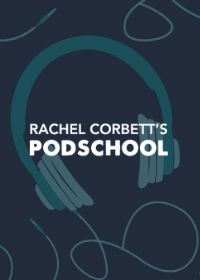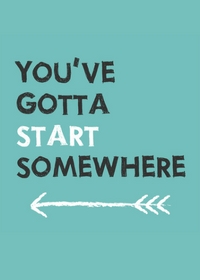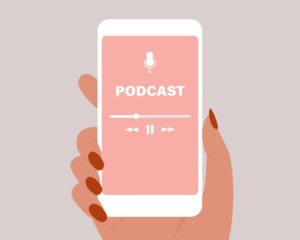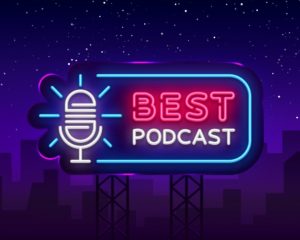
The podcast content beast is hungry
Coming up with content for your podcast can be one of the more challenging and time-consuming parts of the podcasting process, especially if you’re releasing a weekly show.
So how do you find enough ideas to make sure you’re not lying awake on the eve of an episode going live thinking “What am I going to talk about?”
How to come up with podcast content for a ‘niche show’
While all podcasts need to find their niche by ‘niche show’ I mean a show that focuses on a really specific topic rather than a podcast based on topical content (I’ve got tips for finding content for those shows further down).
Google what your competitors are doing
A quick Google search in your topic area will turn up articles and podcasts that have already been published or released.
A word of warning: your goal with this type of research is NOT to copy your competitors.
It’s to see what their content is missing and fill that gap or use it to inspire ideas of your own.
If you copy other shows and you’re in a small niche (or even if you’re not) it won’t take long to get a reputation as the person who rips off other people’s work.
So always look at this kind of research as an opportunity for inspiration, not plagiarism.
Use Twitter Advanced Search
This tool lets you search topics, hashtags and even tweet locations.
It’s a great way to find content other people are sharing (for inspiration) or see what questions people are asking in your niche.
Twitter is somewhere people celebrate their wins, vent their frustrations and ask their community for help so it can be a great source of podcast content if you’re trying to solve problems.
Make sure, if you’re inspired by a tweet, you loop in the person who wrote it when your episode goes live.
It’s a nice way to add a personal touch to your podcast and give back to someone who inspired your show.
Search Facebook Groups and Pages
These can be a great source of podcast content and a great place to build a network…if you do it right.
These groups and pages often have strict rules about spruiking yourself.
So don’t be the person who pops in and starts shouting “Check out my podcast!!!” from the minute you arrive. Because building a reputation in these groups takes time.
If you want to share details of your podcast there are often ‘spruiking days’ where members are permitted to share what they’re up to. And if you’ve been turning up, answering questions and building a presence in the community, people will be keen to check out what you do.
But the impact of sharing your show in groups like this isn’t always significant.
If you want to grow your audience you have to share your show multiple times in multiple places over a long period of time. So sharing in groups needs to be part of a wider strategy rather than an attempt to find a silver bullet (there are none of those in podcasting I’m afraid).
Where I find these pages helpful is as somewhere to look for content ideas.
Finding content for your show is such a huge task that if you come across a page that helps it’s often way more valuable than providing a place to share your show
Aptly named ‘the front page of the internet’ you can find just about anything on this site.
If you’ve got a niche there might be a subreddit that covers it, you’ll just need to do some poking around.
In the interests of full disclosure, I find this site a little frustrating to navigate but it’s an awesome source of content if you can get your head around it.
It’s great mostly because passionate users do the hard work for you and up-vote content they find interesting.
This kind of insight can be helpful when you’re looking for content in your niche that you know people are interested in.
Search your niche on Quora
Quora is a Q&A website where people ask about EVERYTHING.
Beware, you can lose half your life in this site if you’re not careful but you can also set up alerts and search questions that are being asked in your niche.
This can be really helpful when you’re coming up with podcast content because you don’t need to wonder “what do people want to know?”
You can see it right in front of you.
Enter your keyword into Answer The Public
Answer The Public is a site that combines your keyword with a bunch of popular search terms and spews out a mountain of potential topics.
Granted, some of them don’t make much sense but for the most part, it can be a great way to get your brain thinking about topic ideas you might not have come up with yourself.
As an example of the randomness, I typed “podcast” into the search bar.
Some great suggestions like “podcast equipment” came up but so did “podcast near-death experience.”
Arguably less helpful.
Despite those anomalies, for the most part, you can find some great thought starters.
Look for books in your niche on Amazon
Amazon is a useful search engine for a lot of niches. And when you find a book that interests you, you can often check the table of contents to see what it’s about if you don’t want to read the whole thing.
You can also see what other books people purchased which can turn up additional titles in your niche and help surface authors you might not have known about.
It’s a good idea to know what content people are consuming so reading these books for research can help spark ideas for your own content.
Ask your audience
This is only really possible if you have one and even when you do it’s no guarantee they’ll answer. But it’s a good habit to get into on your show.
If your audience knows you’re open to hearing from them they’ll be more likely to get in touch.
And having access to the experience, questions and insights of other people is invaluable because it’s like having another hundred heads working on content for your show.
Podcast content ideas for topical shows…
This style of show is a lot broader than a niche show and usually, people tune in for the chemistry and perspectives of the co-hosts rather than the content itself.
Obviously, you still have to have interesting things to talk about but the areas covered often involve news, pop culture and the personal lives of the hosts.
Search outside the main news sites
Almost everyone will be getting content for these types of shows from the big publishers in their area so look for ones that aren’t as well-known but are still churning out interesting stuff.
Here are some of the ones I’ve used over the years…
Look through regional newspapers
Regional newspapers are one of my favourite places to look for topical content because they’re often where stories that eventually make it to the capital cities are first reported.
Don’t just search for papers in your part of the world either, look for regional papers all over the globe.
When I was hosting my last radio show we dedicated an entire segment every week to stories from the NT News because they were so good (and by good I mean totally random).
Check special interest magazines
You would be amazed at the number of niches that have their own magazines.
Again, in my old radio show, I based an entire segment on Simply Crochet Magazine.
You just never know what you’re going to find but it might spark an idea for a fun/ridiculous segment that’s based on a topic you know absolutely nothing about.
Ask your audience
Encourage them to send in questions, comments or to ask for your advice.
This can yield some of the best content on your show so make sure your audience knows how to contact you.
You can make it easier by having a dedicated show email address or if you want to use the voices of your listeners there are a number of ways to do that, including using Speakpipe or asking them to email in voice memos.
Search social media
No one ever puts boring stuff up on their Facebook or Twitter pages so look through the content your friends and family are posting and see if there’s something there that sparks an idea.
This way you’re tapping into the lives of many different people rather than just your own and this can be really helpful when you’re looking for podcast content.
Got a burning podcasting question you’d like answered? Send me an email.
Want to start your own podcast but need a little help? Download my “How To Start A Podcast” guide or sign up for my online podcasting course, PodSchool.
Hello and welcome to the show. Last week I was talking about the concept of podfade, which is basically getting a few episodes into your podcast and thinking "I've really underestimated how much work this is going to take." Then walking away slowly hoping nobody notices you're not releasing anymore episodes. It happens way more than you would think. If you haven't checked out last week's episode on podfade make sure you do because I go through some of the ways you can prevent that happening before you start. This week I thought I'd focus on one of those elements which is content. This is usually the main reason podcasters will throw in the towel because coming up with content every single week for a show is very very gruelling. If you are doing a weekly show that's 52 shows a year. If you're thinking it's going to take a year or maybe longer to really build an audience then maybe you have to come up with 104 shows worth of stuff before you even start to make a dent. If you are really struggling to come up with ideas for those podcast episodes then it's going to be a much much harder slog. So in this episode, I'm going to go through some of the ways you can find content that isn't just you sitting down searching the dark recesses of your mind hoping that there is something in there that might be entertaining.
I'm going to start off with some tips for shows that are more focused on a niche or are educational. At the end I'm going to look at shows that are potentially more like a radio show where you and your co-hosts sit down and talk. So let's kick it off with that more niche podcast idea. For example something like my show where I'm teaching people about podcasting or maybe you have a love of knitting and you've got a knitting show. Google is obviously going to be your best friend because you can just search your niche and find all of the stuff that's out there on that niche. I would advise going and finding some competitors if you have any in the space or people that are doing stuff and writing content or doing blogs on the same topics that you're going to cover. Please don't copy them for the love of all things Holy. Do not be that person who comes in and blanket plagiarises somebody else's stuff especially if you are in a small niche. That reputation will get around really quick. Basically you want to be looking at other people's content and thinking "What have they missed?" or "How does this inspire me to do something that is more in my voice?" or "How can I come at this from a different angle?" Always use it as inspiration rather than just carbon copy what somebody else has done. That's very important because you don't want a reputation for being the person that goes around and steals other people's content and the more stuff you read from other people the more you will be personally inspired to come up with your own ideas but you always need your spin on it. It can be great to research what other people are doing already and see what's working for other people to spark ideas in you.
Twitter is also another great way to search for content in a niche. If you use the Advanced Search function there are so many different things that you can search or you can be specific about the geographic location of the person that's tweeting or the topic that they're covering or the individual hashtags that you're looking for. That can be a great way to turn up, not only content that is being sent out by people that are in the same niche as you but also questions or problems that people are tweeting out. A lot of people, when they're on Twitter will vent their frustrations about stuff and maybe that gives you an opportunity to create content around that. Then when you're releasing your episode you can take a note of the people who tweeted about it and personally invite them to check out the content as well. That can be a really nice personal way to get content back in to the ears of people who were searching for it and would probably assume they were just bleating into the wilderness and that nobody was hearing their cries. If you actually turn around and say to somebody "Here's an episode that can help you." That can be an awesome way to very slowly chip away at building fans and building a reputation as somebody who's really helpful.
Facebook groups and pages are another way to get great information and questions and content. It is just important that you abide by the rules of the group. You can't just sneak in there and start spruiking your podcast. Often when you join a private group they will have a list of rules and it is very important that you obey those rules. Often one of the ones that's right at the top of the list is no spruiking. So remember these are communities of people who are looking for information or help in a certain area and they have come there to help each other and get guidance. They haven't come to hear you shove your podcast down their throat. If you do that, the page administrator will pretty quickly kick you off. Joining these kinds of groups is a bit of a long-term path to content. You can often find a lot of content in the questions people ask and it's always great for you to jump in and offer your expertise or answer those questions. Giving away answers in the group doesn't mean people aren't going to come to your podcast. It just means you're going to establish yourself as a helpful expert in that group and you'll build a good reputation. Sometimes in these groups, they'll have a specific spruiking day where you're allowed to spruik something and then if you've gone and helped enough people and built your reputation in that group people will see your podcast and think "Oh that's the person that answers all of those questions." So it's a bit of a long-term strategy to get into those groups and to and to make those work for you. But actually, as a short-term strategy a lot of the groups that I join around podcasting are a fantastic source of questions because people are constantly saying "How do I do this?" and I often think "There's a great podcast episode in that." So joining Facebook groups in your niche can be a great way to get content and it's really easy to search them. Just search what you're looking for in the search bar of Facebook and a bunch of those groups will come up.
Reddit is another place that a lot of people get content that I find a little tough to navigate but that could be because I'm old. If you are looking in a particular niche, Reddit has a lot of sub-reddits where they cover content under a specific topic. This site is really content where other people are doing the work for you because they're up-voting and saying what they find most interesting and most exciting and then you can just look at that and go "Oh okay great. That's what most people are interested in I might do something around that.".
Since content has become such an issue for people there are a lot of websites specifically designed to give you the kind of help you need to come up with ideas every single week. One of the great websites I like to use is Quora. That is a Q and A website where people ask questions about everything you can imagine. I mean everything. You can really get lost in the Quora rabbit hole but you can search your specific niche and find questions people are asking in your space. This can be a great way to work out what people want to know rather than trying to guess because you can actually see what people are asking. Sometimes I find great questions in there, sometimes there are random questions around podcasting and I think "Why does anyone want to know this?" but it can be very very helpful, so head to Quora.com to check it out. I will pop a link to everything as well in the show notes page. Just head to PodSchoolPodcast.com and type "content" into the search bar.
There is also a site called Answer The Public where you type in a keyword and it combines that keyword with a bunch of words like "how," "why," "can," and it comes up with a whole bunch of sentences that can give you some ideas that you might not have thought about. Some of the combinations don't make any sense. Just before I started this episode I just typed "podcast" into Answer The Public and things like "podcast equipment" came up which is a great idea for a podcast episode. But also "damn near podcast" and "podcast near death experience" also came up because they were matching the word "podcast" with "near." So some of the ideas are just a mishmash of words that don't make any sense. But for the most part, you can find some really really useful things in there. Again I will link to that site on the show notes page.
Amazon is also great if you search books in your niche. You will often be able to read a few pages of those books in the Amazon store and you can get a sense of what people are writing about. You also might want to buy those books and read them. I find books on things in my niche a really interesting way of getting a bit more of an in-depth look at content. So yes it takes a lot more time to read a book than just type a keyword into a website but it can be another source of content just to see what other people are doing.
Another thing people often suggest for coming up with content is asking your audience. This is great but you often have to build up quite an audience to get any responses. You should definitely start doing this early on but just be patient with responses. This is a great source of content because the people tuning into your show every week are the ones you want to be creating content for so they can be a very useful source of content ideas.
So those are some of the ways if you've got more of a niche offering or an educational show that you can come up with content that isn't just searching your head. If you are doing more of a radio-style show you're obviously going to be dealing more with news, current events, funny stories, pop culture and things that are happening in the moment. When I'm teaching people about how to start their own radio show or cohosting or radio show I encourage people to look at sites other people aren't looking at. This is very important in radio because your competition is often looking at the same newspapers or websites as you are and you're trying to set yourself apart. This is less of a concern with podcasting but you should still be trying to look for unique sources of content outside the main mastheads. In the show notes page of this episode I'll pop a few links to websites I often use for content but it's good to trawl around and find your own.
Sometimes it can take you a while and a bit of searching to find those things but really it starts by searching around for interesting stuff, finding an article on an interesting website and bookmarking that site for next time.
Regional newspapers are also one of my favourite places to look for content if you're doing more of a topical style show. These are often the places where stories that eventually make it to capital city papers start but they're also a place not many people are looking except for the people that live in those areas. Regional papers can yield some of the best tales so they can be a great thing to check out. Try regional papers in your part of the world but also outside your location. I can highly recommend the Northern Territory News here in Australia. Some of the stuff they have on their front cover can be an entire show in and of itself.
I used to go a bit old school when I worked in radio and check out the speciality section of newsagents. You would be amazed at the number of speciality niches there are that can yield some ridiculous content. I think on one of my radio shows I had an ongoing segment based off Simply Crochet Magazine purely because I couldn't believe there was a magazine entirely dedicated to crochet. But sometimes those little niches turn up content you wouldn't have even thought about whether it's funny stories, quiz questions or an idea for a segment for your show.
Again your audience, once you develop one, can be a great source of content on our shows. At Mamamia, we always encourage our audience to email in with their questions, thoughts or conundrums. On our show Mamamia Out Loud, we do a segment called Group Therapy and often our listeners e-mail in with their dilemmas. These can be really serious and emotional or light-hearted and funny but whatever their tone they're great content. Sometimes those segments are our favourite on the show and certainly, they resonate a lot with our listeners. So once you develop your audience you can ask them to send in some of their conundrums or ask them to give suggestions for content.
To find out how to get callers on your show head to an older episode I have about this where I talk about a tool called Speak Pipe. This website allows you to get your listeners to record messages so you can not only use their question but also use their voice on your show to give you a little bit of "audio texture."
Of course, social media can be a fantastic source of content. I used to search Facebook so much when I was in radio and doing my previous podcast, Paul and Rach because Facebook is the place where your friends, family, colleagues and contacts post the funniest, most frustrating, amusing, entertaining aspect of their life. Nobody is putting anything boring on Facebook or Twitter. They're putting up things they find amusing or interesting so check out their social pages and see if those things spark any ideas in you. I used to have a girlfriend of mine who had a couple of kids. I don't have kids so I didn't have any of that kind of content to mine and as you know there is a lot of content in having kids. She used to post some of the funniest things on Facebook about what her kids were doing and that would often be a source of content. Especially my radio days we would often use her Facebook page for phone topics for people to call in because the stuff she was posting was so relatable you just knew so many people would have similar experiences. So look out to your friends Facebook pages and social media pages for content because we all know people just put the most amazing versions of their lives on those things. Nobody is ever saying "I cried myself to sleep at night" even though we know some of us do from time to time.
So I hope that's helped you think about how to get a bit more creative with your content search. You want to try and get on top of this and as ahead of yourself as possible because this will be the one thing that has you dragging your feet and thinking to yourself "This is a lot like hard work!" If you can get the content piece sorted the rest will flow a lot easier. So make sure you think about this creatively. Step outside the box. Don't just rely on your own head and the very best of luck with it.
Thanks so much for joining me of course if you are enjoying this show I would love it if you left a little review in iTunes or wherever you listen. And if you want a little more help with your podcast then make sure you head to PodSchool.com.au and check out my online podcasting course. I'll see you next week and until then, happy podcasting.


























